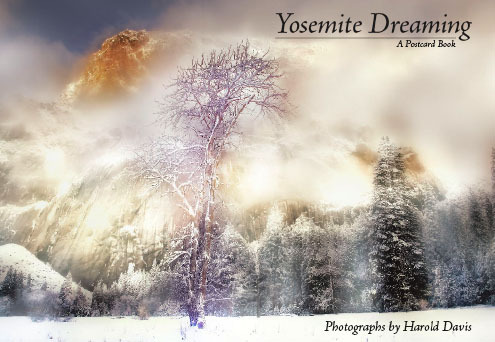Harold Davis's Blog, page 208
February 12, 2013
Introducing…Botanique
Introducing, drum roll, Botanique. I’m pleased that Botanique, my handmade, limited edition artist book of botanical prints is seeing the light of day! It’s very exciting when a new project is made physically manifest—particularly one that embodies as much craft and innovation as Botanique.
Yesterday Phyllis and I attended Codex, a show of handmade books. There were many wonderful objects in the show—but not much good photography, nor any books that I could see created using a pigment printer (letterpress was probably the predominant printing medium). So we look towards the future while acknowledging the past!
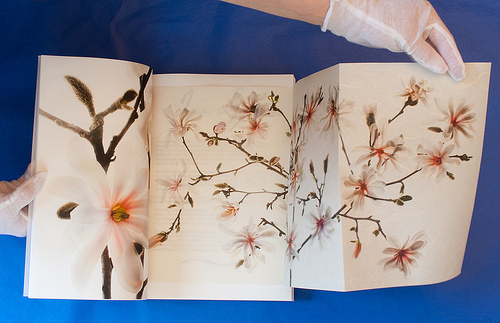
Botanique includes three oversize pull-outs like the Star Magnolia panorama shown on Unryu washi paper
Acclaimed as “origami in a box” and said to be “destined for major museums,” Botanique is an innovative artist project that astutely blends old craft and cutting edge new technologies to create an exquisite limited edition art book and art object that is completely unique.
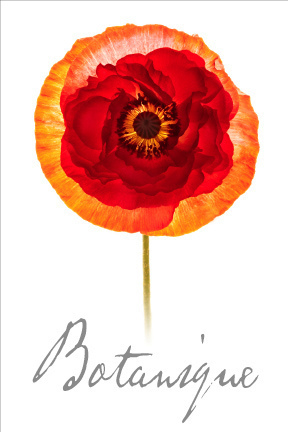
The display font used in Botanique is derived from Walt Whitman’s handwriting
Working together in their studio, legendary photographer and digital artist Harold Davis his wife, graphic designer Phyllis Davis, have combined advanced digital pigment printing with the luscious botanical art of Harold Davis. Every aspect of the project has been carefully designed and hand-crafted.
According to Popular Photography Magazine, the floral prints of Harold Davis “border on the spiritual.” Botanique contains twenty-one luscious floral prints that emerge delicately and seductively from the hand-assembled presentation box. The clam shell box measures approximately 9.25″ X 12.5″ X 1″ deep.
The Botanique project was originally successfully funded and crowd-sourced via a Kickstarter project.
Botanique is presented in a limited edition of 25 copies, with 5 Artist Proof copies. Each copy in the edition is hand-signed and numbered. Copies 1-10 are spoken for, but if you (or someone you like very much) enjoys floral art and beautiful things please consider one of the remaining copies. Please contact my studio for current pricing and availability.
Links for more information:
The Botanique prospectus
Contact Harold Davis studio
Botanique press release
Botanique Kickstarter campaign
A box for Botanique (blog story)
Hot off the press (blog story)
Assembling the Botanique prototype (blog story)

February 10, 2013
Anemones
The North Berkeley farmer’s market, on a stretch of streets sometimes known as the “gourmet ghetto,” is certified organic throughout. Cruising with my camera, I spotted a flower vendor, Thomas Farm, with some wonderful tulips on display. Closer inspection also revealed some anemones, which mostly hadn’t opened yet. The anemones were one bunch for $5 and five bunches for $20. I “haggled” and got six bunches for my $20—a good deal indeed for my inner photographer since once these flowers started to open they displayed gorgeous translucent colors!

Anemones 1 © Harold Davis
Anemones are named for the wind, using the Greek word for wind, anemos. They are supposed to open best when it is windy. Placing them in a sunny room, I found that they are also highly heliotropic—they open with sunshine and close up again at dusk.
So in the middle of the day, using sunshine for front light, I photographed them on my lightbox. For the image shown above I used eight exposures, with each exposure at f/32 and ISO 200. Shutter speeds were between 1/15 of a second and 10 seconds. (If my photographic and post-production techniques for shooting flowers for translucency interest you, you might want to consider the Photography Flowers for Transparency workshop I am giving at the end of 2013.)
I used my 85mm tilt-shift macro lens to make this shot, a lens I once described as “channeling” Edward Weston because it is completely manual and the kind of lens Weston used—you even have to stop it down yourself when you are ready to shoot because there is no auto diaphragm.

February 9, 2013
Yosemite Dreaming postcard book
I am very pleased with a new reader comment on Amazon regarding my Yosemite Dreaming postcard book: “These cards are among the most beautiful I’ve ordered. The comments I’ve received have been overwhelmingly enthusiastic. Quality is high. Enjoyment is higher!”
Thanks AuntyEm!
February 7, 2013
A box for Botanique
Every handmade artist book deserves an elegant presentation box, and Botanique is no exception.
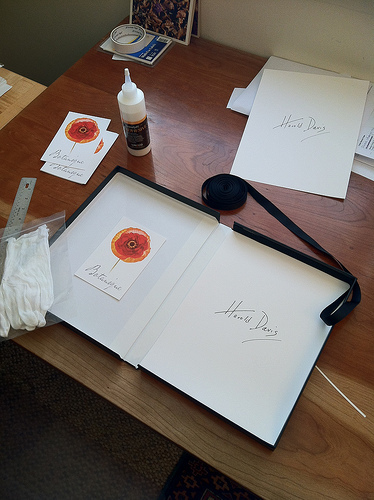
Assembling the Botanique box
As you can see in the photo (left), the box for Botanique is lovingly hand assembled. All the materials we used are fully archival.

Botanique book plate
Closed, the Botanique box is modest in appearance—black and unmarked, with no sign of the luscious color that will spring forth once Botanique is inside! The clam shell box measures approximately 9.25″ X 12.5″ X 1″ deep.
When you open the Botanique box the first thing you’ll see is the book plate on the left-hand side. The book plate was created using one of my Papaver images and the display font used within Botanique. This font is based upon Walt Whitman’s handwriting.
A reproduction of my signature is found on the right-hand side (the inside of the back cover of the box).
When you have an artist book that is as unique as Botanique it is important to create a stage that does the work justice.

Botanique pages unbound
I love surprising people when I open the Botanique box, and they begin to see that the handmade book inside is larger than the exterior of the box.
It is almost as if the box is a door to a parallel universe. Open it, and find that the botanical art is more colorful, luscious, and life-like than the “real thing”—almost the Platonic ideal of floral art rather than the flowers themselves!
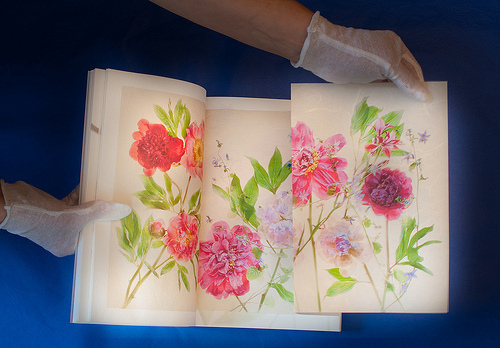
Peonies fold-out within Botanique

February 6, 2013
In Clarion Alley
One of my favorite places to photograph in the Mission District of San Francisco is Clarion Alley—a very magical but somewhat seedy place. Paintings cover the walls, and they are always changing.
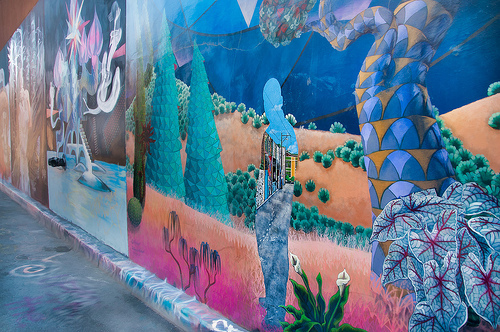
In Clarion Alley © Harold Davis
What I like about my photo above is that the trompe-l’œil depiction of the alley opening from the silhouette in the painting on the Clarion Alley wall seems to show the scene in which I was standing, duplicated—perhaps in another, parallel universe.
In the photo below, a fearsome San Francisco death head seems to be peering at a woman in the forest. I like that the two very different paintings are interacting, which is why I called it Death and the Maiden.
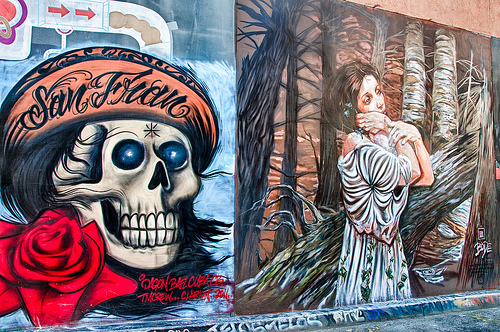
Death and the Maiden © Harold Davis
What will be on the walls of Clarion Alley next time I visit with my camera? Who knows, but I can’t wait to find out!

February 5, 2013
Models are people—not things
In the Pixar movie Finding Nemo one of the characters is a shark named Bruce in a 12-step program. Bruce has extremely dangerous looking teeth, and clearly has an appetite for fish. In a meeting of his 12-step program Bruce loudly chants, “Fish are friends, not food” in an Australian accent—although if I were a smaller fish I wouldn’t want to tempt this particular shark by getting too close!

Jade © Harold Davis
I try to keep a mantra similar to Bruce’s in mind when I photograph models. Models are people, not things. If one takes the time to get to know the person behind the model facade even a bit, the results can be inspiring. After all, people have character, and capturing this character is an important part of what model photography is about—even (or particularly) when the camera is pointed at a subject who is model and is a beautiful woman.
A case in point is the shot of the beautiful model Jade, shown above. Jade is best known for her fetish look. You can visit her website by clicking here. When I shot Jade as a person I was pleased to get a somewhat different look: personal, playful, and somewhat sexy but without the hard edges seen in most of the photos of her.
Repeat after me, models are people—not things!
Click here to see the models category on my blog, and here to see a gallery of my model photography.

February 1, 2013
Papaver Solo
I’ve been spending time in my garden this week, getting it ready for spring. Actually, around here it is spring already, with sunny weather in the sixties. My poppy seedlings are growing briskly, reminding me happily that soon it will be time to photograph Papavers once again—like the backlit flower below (two different washi paper scans were added as a decorative background).
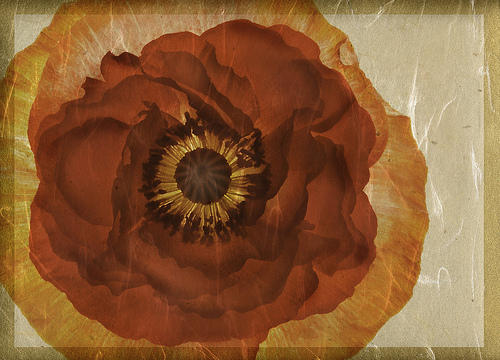
Papaver Solo © Harold Davis

January 30, 2013
Bay Bridge Lights
In this image of the Bay Bridge the moon seems to be “captured” within the tower of the Bay Bridge. The image is a hand-HDR blend of six exposures at shutter speeds from 1/2 of a second to 8 seconds. During one of the exposures the lights for The Bay Lights, an art installation and project by Leo Villareal that will come on “for real” on March 5, 2013 appeared briefly (in testing mode I guess), and I painted them in on a layer at about 30% opacity. Note that this light show has nothing to do with the 75th anniversary of the Bay Bridge, which has come and gone—and is simply a rather wonderful art installation.
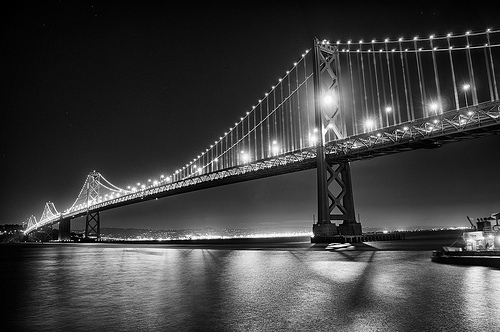
Moon Captured by the Bay Bridge – Black & White © Harold Davis
The sequence of exposures in this image was shot during Saturday’s smashing moonrise adventure workshop—which I feel was good photographically and a very successful workshop despite the break-in of my van. I started with color images, combined them, manipulated them in post-production to create an image with an extended range of tonal values—withthe results shown below. To finish the image, I then converted it to black and white, using layers and masking to control how each section of the image converted.
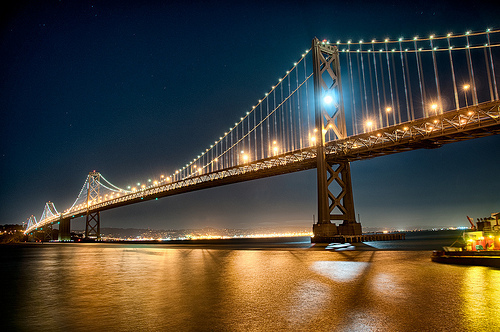
Moon Captured by the Bay Bridge – Color © Harold Davis

January 28, 2013
Smashing Moonrise Workshop
The San Francisco Moonrise Adventure workshop on Saturday was a smashing success. Despite some unexpected logistical difficulties—due to a demonstration on Market Street—we settled into our Embarcadero waterfront location in good time. The moon rose mostly where it was supposed to, and is shown here over Port Oakland. The photo was shot under the Bay Bridge using my 300mm lens. I’ll be posting more photos of the moon interacting in complex and photographically interesting ways with the Bay Bridge itself!
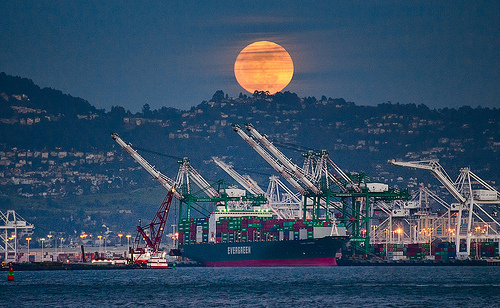
Moonrise over Port Oakland © Harold Davis
Not to take away from the workshop and how much fun it was, but unfortunately “smashing” applies to what happened to my van, parked near the Embarcadero in downtown San Francisco while the workshop was transpiring. The rear window was smashed. The bad guys got a briefcase with my iPad and the prototype of Botanique—currently, the only existing copy.
Well, we’re assembling the actual copies of the edition this week, so there will soon be more copies.
It’s hard to imagine that the smash-and-grab thief has much interest in an archival box filled with oragami-like botanical art. So my fantasy is that it was immediately discarded, and will turn up in twenty years or so when the rest of the copies in the edition are in major museums. There will be much debate about the provenance of the prototype before it is auctioned for megabucks at Sotheby’s.
Returning to earth, if you happen to be wandering in downtown San Francisco and see a box of botanical art in the gutter pick it up! Let me know!
I’m not giving up on San Francisco photography, but will be more careful about where I park in the future. Please consider joining me in the Mission on Saturday February 23—I know it will be a fantastic shoot!

January 25, 2013
Hot off the press
The pages of Botanique—my hand made, limited edition artist book—have all been printed. Some of them are shown here on the table formerly known as our dining room table. You can read about assembling the Botanique prototype by clicking here, and click here for the Kickstarter campaign that used crowd-sourcing to fund this unique project that uses cutting-edge technologies in combination with hand crafting in a made-in-the-USA cottage industry project. I also like the way the aesthetic combines the old with the new, and echoes both 19th century botanical prints and Asian art while looking towards the future of digital photography.
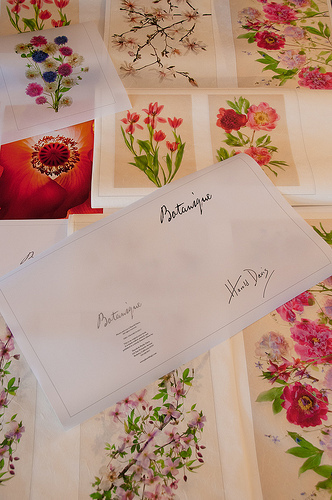
Botanique pages hot off the press © Harold Davis
The next step is to assemble the actual copies in the edition, and deliver the ones that have already been sold.
I am excited about the level of interest in Botanique. At the risk of being immodest I understand why, every time I take my prototype copy out of its box. It’s fun to show it to people and watch their jaws drop! We’re of course very pleased by how many of the copies in the edition have already sold—Botanique is already a huge success—and thank you to everyone who has supported my art via this venture.
There are only two copies left in the $750 price tier. Please contact the studio if you would like to reserve one of them.
I can’t wait to post some photos of the finished Botanique—probably early in the coming week.


